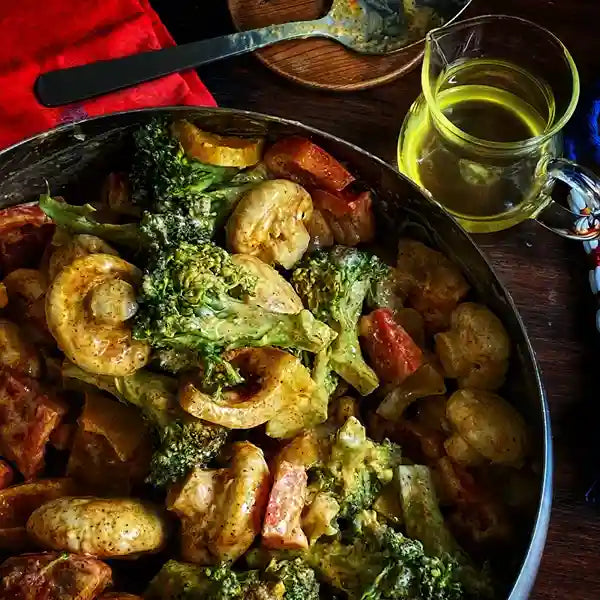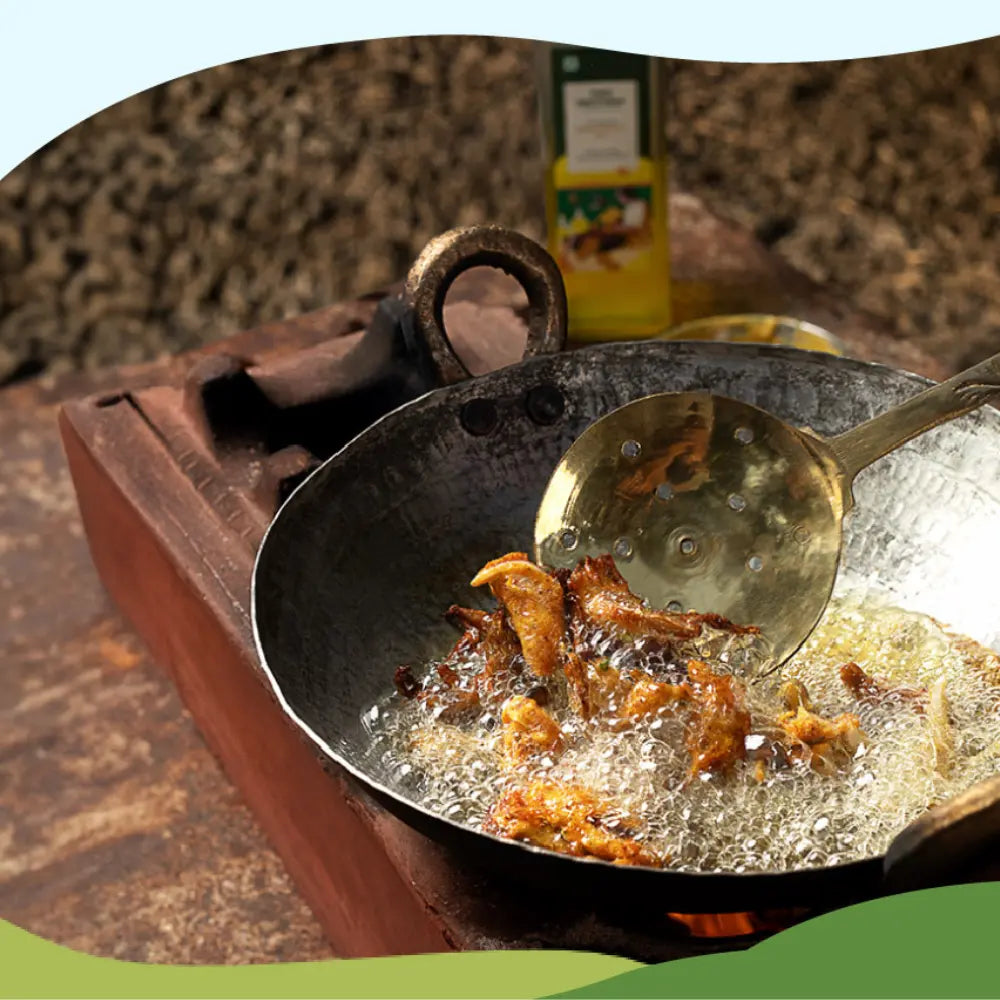So, you've embarked on the gluten-free journey, huh? Whether you're hopping on the gluten-free train due to dietary needs or just because you're curious, one thing's for sure: this trend isn't going anywhere!
Now, let's talk about benefits. Gluten-free flours aren't just for folks with sensitive tummies; they're chock-full of nutrients to keep you tip-top. Plus, with their lower glycemic index, they're like little digestive superheroes for your stomach!
But let's be real – picking the right flour for you and your recipes can be a bit of a head-scratcher, right? Worry not, because we'll drop some knowledge bombs on you. We've got, 'jowar', 'sattu', and a couple more in this gluten-free flours list!
So, whether you're whipping up a batch of cookies or crafting the perfect pizza crust, these gluten-free flours are here to save the day. Because hey, gluten-free cooking should be a breeze – and with the right flour in hand, it totally can be!
Exploring The Best Options of Gluten-Free Flours
Gluten sensitivity is when your body doesn't agree with gluten, a protein in wheat, barley, and rye. It can lead to all sorts of discomfort like tummy troubles and fatigue.
But there's a silver lining: gluten-free flours. They're made from stuff like rice, almond, or coconut, and they're free of that pesky gluten. Plus, they usually have a lower glycemic index compared to regular wheat flour.
That means they won't send your blood sugar levels on a rollercoaster ride, which is great for folks with diabetes or anyone trying to keep their blood sugar in check.
And here's the kicker: these gluten-free flours often pack more nutrients and fibre than your typical wheat flour. So not only are you sidestepping those pesky gluten-related symptoms, but you're also giving your body some extra love with a healthier option. Talk about a win-win!
1. Jowar Flour
To make your digestion easier, gluten-free Jowar flour made from native organic millet can be a great option. From India to parts of Africa, this staple is gaining popularity worldwide. With a slightly sweet and nutty flavour, this versatile ingredient works well both for sweet and savoury recipes.
Benefits
- Its anti-inflammatory properties protect against heart diseases and drop your cholesterol levels.
- Packed with antioxidants, jowar flour gives you stronger bones and high energy.
- Being gluten-free, this flour lowers your blood glucose level and aids in digestion,
- Loaded with high fibre, it lowers the risk of obesity, stroke, high blood pressure, heart disease, diabetes, and digestive issues and keeps you full for long thus preventing overeating and aiding weight loss.
Next comes a nutty and earthy flavoured flour that can be used for your baking purposes.
2. Sattu Flour
Packed with high protein and fibre, it's a boon for vegans seeking plant-based sources of protein. Its gluten-free nature makes it an ideal choice for those with gluten sensitivity, while its lower fat content adds to its appeal. It is known to have high protein and has the following benefits:
Benefits
- With highly soluble fibre, sattu atta controls your cholesterol levels, keeps your heart healthy, helps in blood circulation, and aids in digestion.
- Filled with iron and protein, this atta can gift you with glowing skin and healthy hair.
- With its low glycemic index and fewer calories, it can be a healthy alternative for diabetics.
- Helping in regaining lost nutrients and providing energy, this can be a great choice for pregnant women.
- Loaded with potassium and magnesium, it improves your appetite and boosts your muscles while increasing your energy.
Can you guess what comes next? Continue reading to know more!
3. Soya Bean Flour
If you are searching for a versatile ingredient in both savoury and sweet recipes, soybean flour can show its magic with its mild and nutty flavour. Sourced from ground soybeans, this flour is high in fibre, protein, and other nutrient content which makes it fat-free and cholesterol-free.
Additionally being gluten-free, soybean flour is appropriate for people with dietary sensitivities to gluten.
Benefits
- Being a great source of potassium, iron, and vitamin B, this flour improves your heart health, makes bones strong, and reduces menopausal symptoms.
- Packed with fibre, proteins, vitamins, and minerals, it is highly beneficial for growing children.
- Its rich content of OMEGA-3 fatty acids prevents the risk of heart disease.
- Being a high-quality gluten-free vegetarian protein, it is essential for people with diabetes, health consciousness, heart patients, and older people.
|
Fact Check: Bajra's been a staple in Indian cuisine forever, especially in dry regions where it thrives. But here's the kicker: it's more than just food—it's a symbol of resilience. In some Indian cultures, it's like the superhero of crops, thriving in scorching heat and poor soil, and still providing sustenance. So yeah, it's not just a grain; it's a symbol of strength and reliability. Cool, huh? |
4. Bajra Flour
Bajra flour, derived from pearl millet, is a nutritional powerhouse with a rich history in Indian cuisine. It's gluten-free, packed with fibre, and boasts a range of essential nutrients.
Benefits
- Bajra is rich in dietary fibre, promoting digestive health, preventing constipation, and aiding in weight management by promoting a feeling of fullness.
- It's a good source of essential nutrients such as iron, magnesium, phosphorus, and potassium, contributing to overall health and well-being.
- Bajra has a lower glycemic index compared to other grains, which helps in managing blood sugar levels and reducing the risk of diabetes.
- The presence of antioxidants and micronutrients in bajra supports cardiovascular health by lowering cholesterol levels and reducing the risk of heart disease.
FAQs: The Best Gluten-Free Flours for Your Kitchen
How long does gluten-free flour last?
Gluten-free flour typically lasts for about 6 to 12 months if stored in an airtight container in a cool, dry place away from sunlight and moisture.
Is gluten-free flour good for baking?
Yes, gluten-free flour can be excellent for baking, especially for those with gluten intolerance or celiac disease. It produces delicious baked goods with a unique texture.
Why is gluten-free flour more expensive?
Gluten-free flour tends to be more expensive due to the costlier production process, sourcing of alternative grains, and smaller market demand compared to conventional wheat flour.
Conclusion
All these types of gluten-free flour have a distinct flavour, taste, and numerous health advantages. From the nutty sweetness of Sattu flour to the earthy richness of Jowar atta, Two Brothers Farm provides a wide range of flour options that you can use in your regular cooking to enhance the taste and quality of your meal.
Experience the goodness of nature in every meal when you cook with Two Brothers' organic gluten-free flour.














